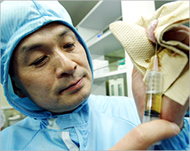Indian parents bank cord blood
More Indian parents are banking blood from the umbilical cords of their newborn babies as the country’s biotechnology sector profits from a high birth rate and the potential of stem cell research.

More than 4000 Indian parents have had the blood cells from their children frozen, to be revived if and when there is a scientific breakthrough.
Bondita Bhattacharya, 39, is one of those parents. She paid 60,000 rupees ($1333) for the process on her baby, born last month, as she had “nothing to lose”.
She says: “It is like taking an insurance policy. It is safe. In the future I am sure there will be a breakthrough in stem cell research. They may come out with a cure for diabetes or cancer. I will regret if I am not able to take advantage of that.”
Blood that is extracted from the baby’s umbilical cord and placenta discarded after birth is full of stem cells, according to doctor Nalini Krishnan, medical adviser of LifeCell, a firm that deals in preserving umbilical cord blood.
 |
|
Bondita Bhattacharya says she |
Stem cells are master cells from which the body’s immune and blood system originate and which can develop into cells of any organ.
Krishnan says these cells can help cure more than 75 serious ailments.
“Collecting and preserving the baby’s cord blood stem cells is a security blanket for your baby and immediate family members. It is effective in the treatment of leukemia, anaemia, inherited disorders and several other deficiencies of the immune system.”
The two Indian companies that offer umbilical cord blood cell banking, LifeCell and Reliance Life Sciences, have a combined repository of more than 4000 units.
Growing business
Abhay Kumar, chief executive of LifeCell, says: “Our target is to get to 15,000 units by the end of next year and grow our presence from the current six cities to 25.”
The company was set up a year ago and has a collaboration with Cyro-Cell International of the United States.
“We will be opening two banking centres outside India during the next year and [expect to] clock 10 billion rupees within the next five years,” Kumar says. “The opportunity is big as there are 26 million births in India every year.”
LifeCell says they follow ethical standards, but controversies surround stem cell research.
In December, South Korean investigators said that apparent landmark research by cloning expert and one-time national hero, Hwang Woo-Suk, had been faked.
Roopa Devi, 26, a doctor, who banked her son’s umbilical cord blood cells at LifeCell’s facility in the southern city of Chennai a month ago, is not worried by the controversy.
Banking blood, she says, is the “best gift” a parent can give to their children.
Devi says: “In today’s world everybody needs a little bit of help to sail through life. Why should my son be denied that? I do not want to shut any options for my son. I know at present the research is shrouded in a bit of controversy. But you never know what will happen.”
Doctors collect the cells once the umbilical cord is clamped and cut, using a ”collection kit” supplied by one of the two companies.
Easier availability
Officials then send the package to their laboratory, where tests are done for infectious diseases such as hepatitis and malaria, and the HIV virus.
 |
|
Disgraced Korean cloning expert |
After that it is frozen in liquid nitrogen at minus 196C (minus 320F) at a facility which Abhay Kumar says is “earthquake and bomb-proof”.
KV Subramaniam, the chief executive of Reliance Life Sciences, says research using umbilical cord blood cells was easier than from embryonic stem cells or from adult bone marrow, due to easier availability.
He says India is simply planning for the future.
“India is yet to carry out its first cord blood stem cell transplantation but is getting gearing up. Quite a few countries are betting big on stem cell based therapies.”